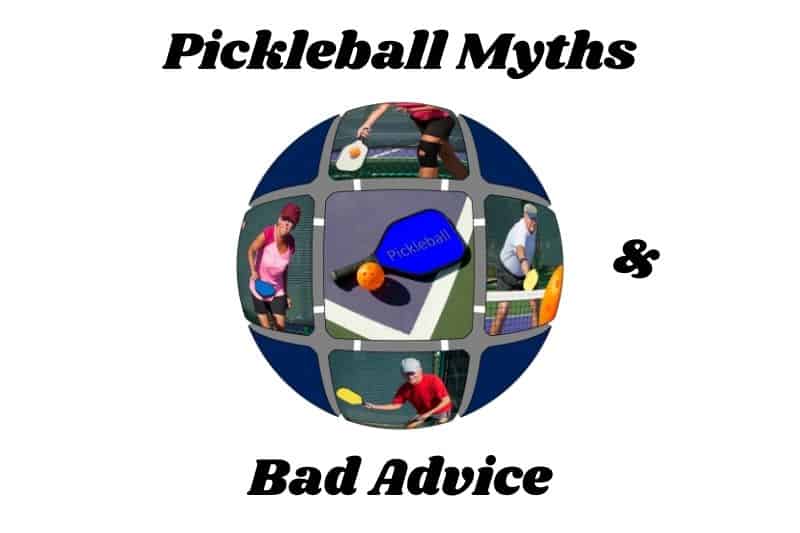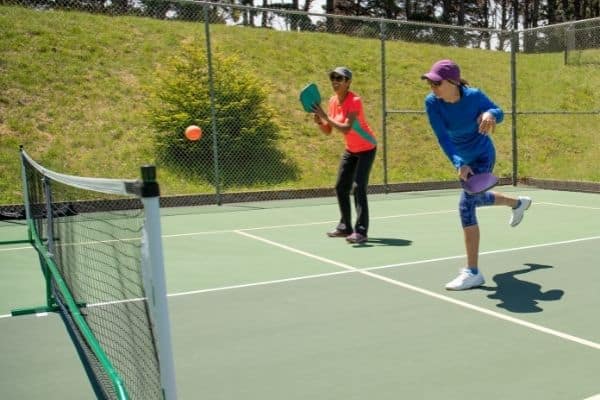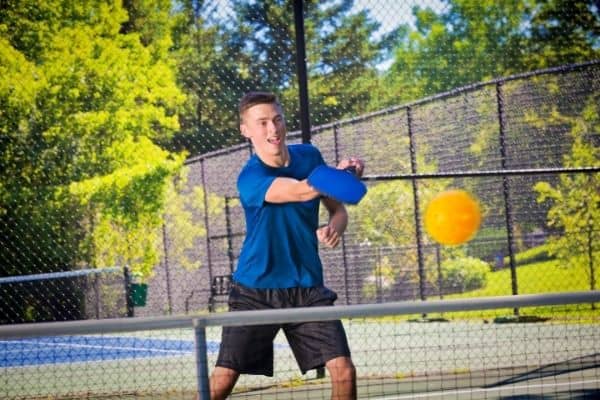
While playing pickleball in rec plays can be a fun social environment, you will often find unsolicited advice from other players. While some tips can be helpful, there is a lot of coaching that is misinformed or plain wrong for the level that you may be playing at. Here are common pickleball myths and bad advice that gets around and what you want to do instead.
Rushing To The Kitchen Line
Perhaps the most common among the pickleball myths that are often cited again and again in rec play is rushing to the kitchen line. You may have people telling you to “go, go, go”. Yes, you want to get to the kitchen line. But rushing to the kitchen line without the context of where the ball is and when your opponent is swinging their paddle is bad advice.
If you’re serving the ball, wait for a return before you walk to the kitchen line. If you hit the return shot, stop where you are and get yourself in a balanced and ready position if your opponent’s paddle is about to contact the ball.
You don’t want to be moving where your opponent can easily hit the ball to your feet. While your court position is important and getting to the kitchen line is important, it is more important that you’re ready and balanced to take the next shot. You can then continue to make your way to the kitchen.
Hit The Ball Low
Another tip that is too common among pickleball myths is to hit the ball as low near the net as possible. While you don’t want to be hitting the ball high enough for your opponents to easily put the ball away, you also shouldn’t aim to hit the ball so low that it barely clears the net.

In pickleball, you want to go for your high-percentage shots to reduce unforced errors. Give yourself enough margins that your shots will always go over the net, instead of hitting the tape. The longer that the ball is in play, the more opportunity you will have to create better scenarios for a putaway.
You will also be able to get more variety and more hits, which will improve your overall game. But if you’re aiming for a tiny clearance over the net, the point will be over when the ball hits the net and the point ends.
Attack To Win
There are those in rec play that think you need to hit the ball hard or attack in order to win the point. However, you will see that placement can be more advantageous than power. It is necessary to learn to attack, however, it is not the only way to win a point. Dinking can be as effective in causing your opponent unforced error rather than driving the ball at them where they can block it.
If you’re attacking to win, you must attack the right ball. Because if you’re trying to attack a ball that is the net height or lower, it will most likely go into the net. If you’re attacking to only hit at your opponent’s paddle, the ball will boomerang back to you. You want to look for good opportunities to attack to win. Not just plainly attack.
Stay Only On Your Side
Poaching can be a controversial subject for rec play. However, there are times when poaching can be very advantageous. If your partner moves slower or is back at the baseline and your opponent has hit the ball to them, you don’t only have to stay on your side. You can poach the ball and hit it out of the air to put it away.
Because if you’re only staying on your side of the court every time, it is easy for your opponents to hit at the person staying back. However, some people may not appreciate excessive poaching. It is only when poaching makes sense to put away the point. That is why it is important to communicate with your partner and have an understanding of who should take what balls.
Learn How To Spin The Ball
You may see some players in rec play attempting to do fancy backspin and slices. Some coming with tennis may slice the ball very well while many send the ball out of the court or into the net. Others may try to put a spin in every shot, including dinks. But the truth is unless you’re at a very high level of playing pickleball, you don’t need fancy spins to play the sport well.
Remember, playing pickleball well means hitting high-percentage shots and reducing unforced errors. If you’re trying to worry about putting spins while you’re trying to balance, select the right shot, and be mindful of everything else going on the court, you may run into unforced errors.
If you do want to learn and practice spin shots, it should be a part of your drilling routine. Drilling is so important to improving your game if you’re serious about becoming a better pickleball player. All you need is a bag of balls and a partner to get started.
Last Tips
There are other pickleball myths that you may come across. Some myths may have half-truths in them. That is why they tend to spread around. The most important thing is that you apply the right tips and advice for your playing level. Working with a pickleball coach may be extremely helpful in this area.
Read Next: 5 Reasons Why You’re Not Getting Better At Pickleball


